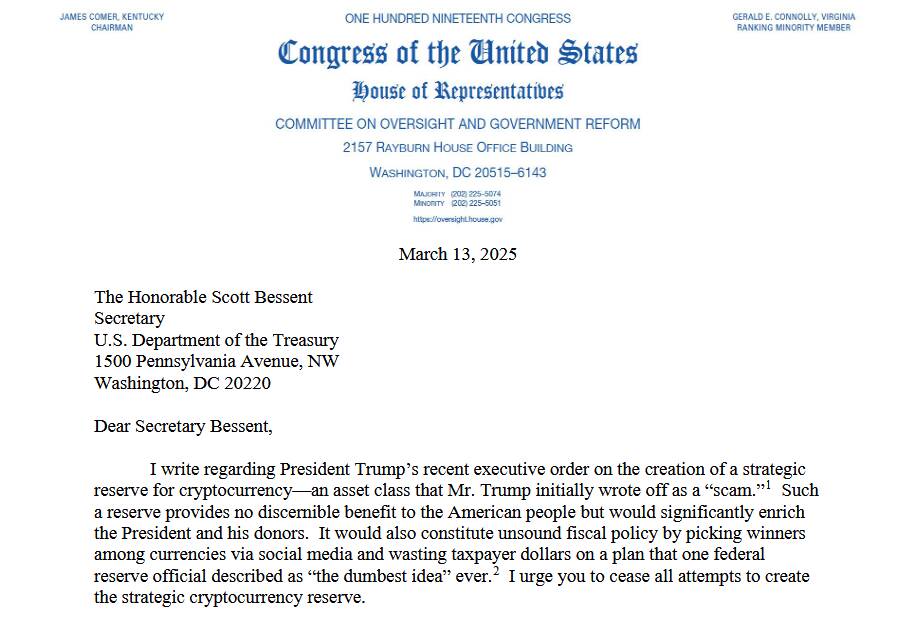In a recent development echoing the ongoing debate surrounding cryptocurrency regulation, House Representative Gerald E. Connolly, a Democrat from Michigan, has taken a strong stance against the U.S. Treasury’s plans to create a strategic cryptocurrency reserve. In a letter dated March 13, Connolly urged Treasury Secretary Scott Bessent to “cease all attempts” to establish this reserve, highlighting significant concerns regarding the implications of such a move. He argues that the proposed stockpile could disproportionately benefit President Donald Trump and his associates, rather than the American public as intended.
Connolly’s criticism centers on the notion that the cryptocurrency reserve, which he conflates with the proposed Strategic Bitcoin Reserve, lacks any clear advantages for taxpayers. The lawmaker described it as a potential “highly speculative taxpayer-backed hedge,” designed to financially support bitcoin investors during market downturns. He referenced previous comments from the Federal Reserve, labeling the reserve idea as “the dumbest idea ever,” reinforcing a bipartisan skepticism around the fiscal prudence of investing in the unpredictable cryptocurrency landscape.
The White House, however, has clarified that the Digital Asset Stockpile is intended to utilize only cryptocurrencies that have already been forfeited, ensuring that any acquisitions occur through budget-neutral means, which aim to shield taxpayers from financial risk. Furthermore, Connolly raised alarms regarding potential conflicts of interest, particularly concerning Trump’s links to crypto entities like World Liberty Financial and the controversial TRUMP memecoin, which he described as a “money grab.” This has spurred criticism from other lawmakers, including Representative Maxine Waters, who deemed the memecoin’s launch as indicative of the “worst of crypto.”
“No strategic need has arisen that would necessitate investment in the volatile and speculative cryptocurrency market,” Connolly stated emphatically.
Connolly has requested comprehensive documentation related to the cryptocurrency reserve’s formation and the associated potential conflicts, as well as validation that oversight measures have been appropriately implemented. The discussions surrounding the strategic reserve underscore the tensions within the U.S. government regarding the regulation of emerging digital assets, illustrating the complexities and implications of intertwining fiscal policy with the rapidly evolving world of cryptocurrency.
Concerns Over Proposed US Strategic Cryptocurrency Reserve
The proposal for a strategic cryptocurrency reserve in the US has raised significant concerns among lawmakers, particularly regarding conflicts of interest and the potential impact on taxpayers.
- Criticism from Lawmakers:
- Rep. Gerald E. Connolly called for the US Treasury to stop its plans for a strategic crypto reserve.
- Connolly argues that the reserve serves no benefit to the American public, merely enriching President Trump and his associates.
- Concerns About Fiscal Policy:
- The proposed reserve criticized for promoting “unsound fiscal policy” by prioritizing certain cryptocurrencies.
- Connolly describes the investment in volatile cryptocurrencies as a speculative hedge using taxpayer money.
- Waste of Taxpayer Dollars:
- The Federal Reserve has termed the idea of a cryptocurrency reserve as “the dumbest idea ever.”
- Conflict of Interest Allegations:
- Concerns raised about Trump’s affiliation with World Liberty Financial and his memecoin TRUMP, suggesting a conflict of interest.
- Highlighting a financial motive behind the cryptocurrency initiatives linked to Trump and his organization.
- Lack of Congressional Consultation:
- Connolly criticized the lack of consultation with Congress regarding the Bitcoin reserve plan.
- Risks Associated with Cryptocurrency:
- Volatility and speculation in the cryptocurrency market may pose risks to taxpayers who might be indirectly supporting these investments.
- Questions raised regarding regulatory oversight and the potential for companies linked to the administration benefiting from the reserve.
Political Fallout Surrounding the US Strategic Crypto Reserve Proposal
The call by Democrat lawmaker Gerald E. Connolly for the US Treasury to halt plans for a strategic cryptocurrency reserve casts a spotlight on the controversial intersection of politics and digital assets. Unlike other proposals within the cryptocurrency sphere, the criticism highlights significant concerns of conflicts of interest and the potential misuse of taxpayer funds. Representative Connolly argues that the initiative stands to benefit only a narrow band of political elites, specifically pointing to US President Donald Trump and his associated entities. The emphasis here is on accountability and transparency, fundamental values that resonate widely with both critics and supporters of cryptocurrency.
One of the prominent advantages of this proposal, purportedly, is its intention to remain budget-neutral. The White House claims that any crypto acquisitions would not require taxpayer money, relying instead on forfeited assets from federal cases. This approach, if properly managed, enables a new frontier for government involvement in digital assets without direct financial implications for citizens. However, while these strategic intentions may create a veneer of responsible fiscal management, detractors like Connolly raise alarms about the genuine benefit to everyday Americans. There’s a palpable sense that, despite any budgetary assurances, the actual end-users of these reserves could remain uninvolved or disillusioned by the process.
In contrast, the rapid growth of decentralized finance (DeFi) platforms and investor confidence in cryptocurrencies indicates a favorable environment for innovation. However, the push against the strategic reserve puts a damper on potentially progressive governmental engagement with this field. Opponents argue that the reserve could further entrench speculative behavior and risk exposure without adequate regulatory frameworks. Critics like House Financial Services Committee member Maxine Waters echo these sentiments, considering the reserve a misuse of resources that could culminate in taxpayer losses amidst a volatile market landscape.
This schism in perspectives opens up a vivid battlefield for political discussions around cryptocurrency. For investors and crypto advocates, the situation is a double-edged sword. On one hand, the recognition of digital assets at governmental levels can propel legitimacy; on the other, excessive regulatory scrutiny can stifle innovation and progress. Notably, individuals and businesses involved in crypto-related ventures might view Connolly’s advocacy as a defensive maneuver, potentially rallying them to push for more robust legislative protections and fairer regulatory frameworks.
Ultimately, the political dimension of these discussions may also be more impactful for the average investor. Concerns about ethical governance and the integrity of financial systems are paramount; failures in transparency can lead to inherent distrust illustrated in past failures of crypto projects. For the average American looking for genuine support in navigating this evolving landscape, the outcome of this scrutiny could signify a shift towards either a promising frontier of adaptive financial inclusivity or a regression into entrenched political paradigms obstructing real innovation.

















